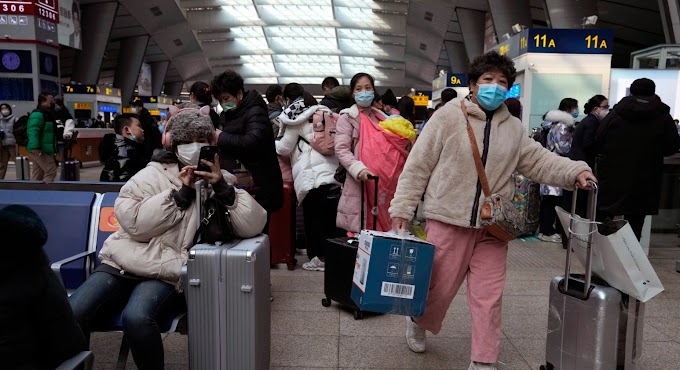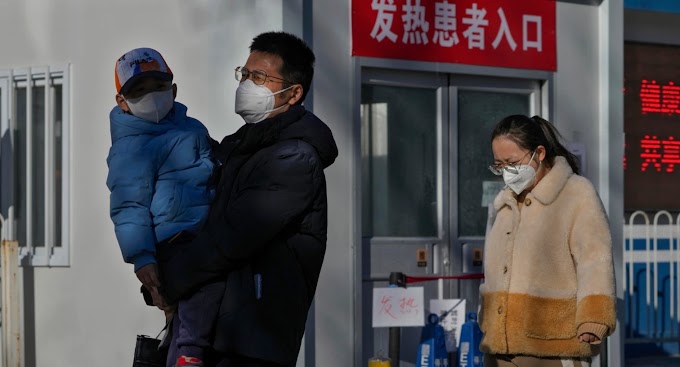The United States will require Chinese passengers to provide a negative certificate for the new crown test Expert: the measure is appropriate but the effect may be limited
 |
| CDC |
WASHINGTON —
The U.S. Centers for Disease Control and Prevention (CDC) announced on Wednesday (December 28) that the U.S. will require all children aged two and two entering the U.S. from China (including Hong Kong and Macau) to Passengers over the age of 10 should present a negative COVID-19 test certificate within 48 hours before boarding the plane. This requirement will also apply to passengers departing from China and arriving in the United States via a third country. Public health experts believe the U.S. move is appropriate given the limited case data provided by China, but there are also concerns that the new rules may have little real effect.
The US Centers for Disease Control and Prevention stated in a press release on Wednesday that in view of the lack of sufficient and transparent epidemiological and virus genome sequencing data in China, the CDC announced this measure to slow down the spread of the virus in the United States during the surge in cases of infection in China. spread.
The United States is concerned about the rapid spread of the new coronavirus in China, federal health officials said on Wednesday, raising the possibility of new variants emerging. Officials say China has provided limited monitoring data on the surge and has rejected U.S. offers to provide vaccines. It follows restrictions on travelers from China in countries including Japan and Malaysia.
At present, the number of people infected with the new crown in China has exploded, and large-scale and widespread infections have appeared in many parts of the country. However, China's National Health Commission announced on December 25 that it would no longer release daily epidemic information. The agency also stated that from January 8th, inbound passengers only need to provide a negative nucleic acid result 48 hours before departure, and no longer require inbound passengers to be quarantined.
Professor of Georgetown University Law School, World Health Organization Public Health Law and Larry Gostin, director of the Human Rights Coordinating Center, believes that the entry control measures adopted by the US Centers for Disease Control and Prevention are appropriate and should be implemented immediately.
"The current number of new crown cases in China is exploding, so the response of the United States is reasonable," he told Voice of America, "I think the CDC should further require passengers to be tested 24 hours before leaving China, and infants under two years old should be tested. Young children should also be tested. More importantly, CDC should implement this testing requirement immediately, not wait until January 5th."
Chen Xi, an associate professor at the Yale School of Public Health, also believes that the response of the United States is reasonable, but how to implement this measure, especially for passengers entering from third countries, will be challenging.
"We don't want this to contribute to any anti-Asian racism and xenophobia, so it has to be implemented with great care," he told VOA. "The purpose of this measure is to ensure the safety of travelers and residents at the destination."
some public health experts believe that the new measures may not have a substantial effect.
"I think such measures will only have a marginal effect, because the new crown is also very popular in the United States at the moment," said Dr. Amesh Adalja, a senior researcher at the Johns Hopkins University Center for Health Security. "I think it's better to recommend that people take a test after traveling to China, rather than make it mandatory," Yin said.
On Monday, China's National Health and Medical Commission announced that starting from January 8, it will no longer require inbound passengers to be quarantined and will cancel nucleic acid testing and centralized quarantine for all staff after entry.
This marks an important step for China to loosen its borders. As soon as the news came out, Chinese citizens who hadn't been abroad for three years flocked to the travel agency network and started booking future trips abroad.
However, due to the current explosive growth of the number of new crown infections in China, in addition to the United States, some countries have immediately announced quarantine regulations for Chinese tourists.
Japan said on Tuesday that it will implement emergency measures to strengthen entry epidemic prevention from midnight on December 30. Entry testing will be implemented for all personnel who have traveled to Japan from China and have been to China within seven days, and those who are positive will need to be quarantined for seven days.
The South Korean government has included China on the list of "quarantine key countries" on December 16, and will strengthen the new crown screening of Chinese immigrants. Likewise, India and Malaysia have also announced enhanced inspections for travelers from China.
At the same time, there are also countries that oppose the imposition of special travel requirements for Chinese citizens. Singapore Airlines will resume direct passenger flights between Singapore and Beijing, China this Friday. It was the airline's restart of passenger service to Beijing after a nearly three-year hiatus.







